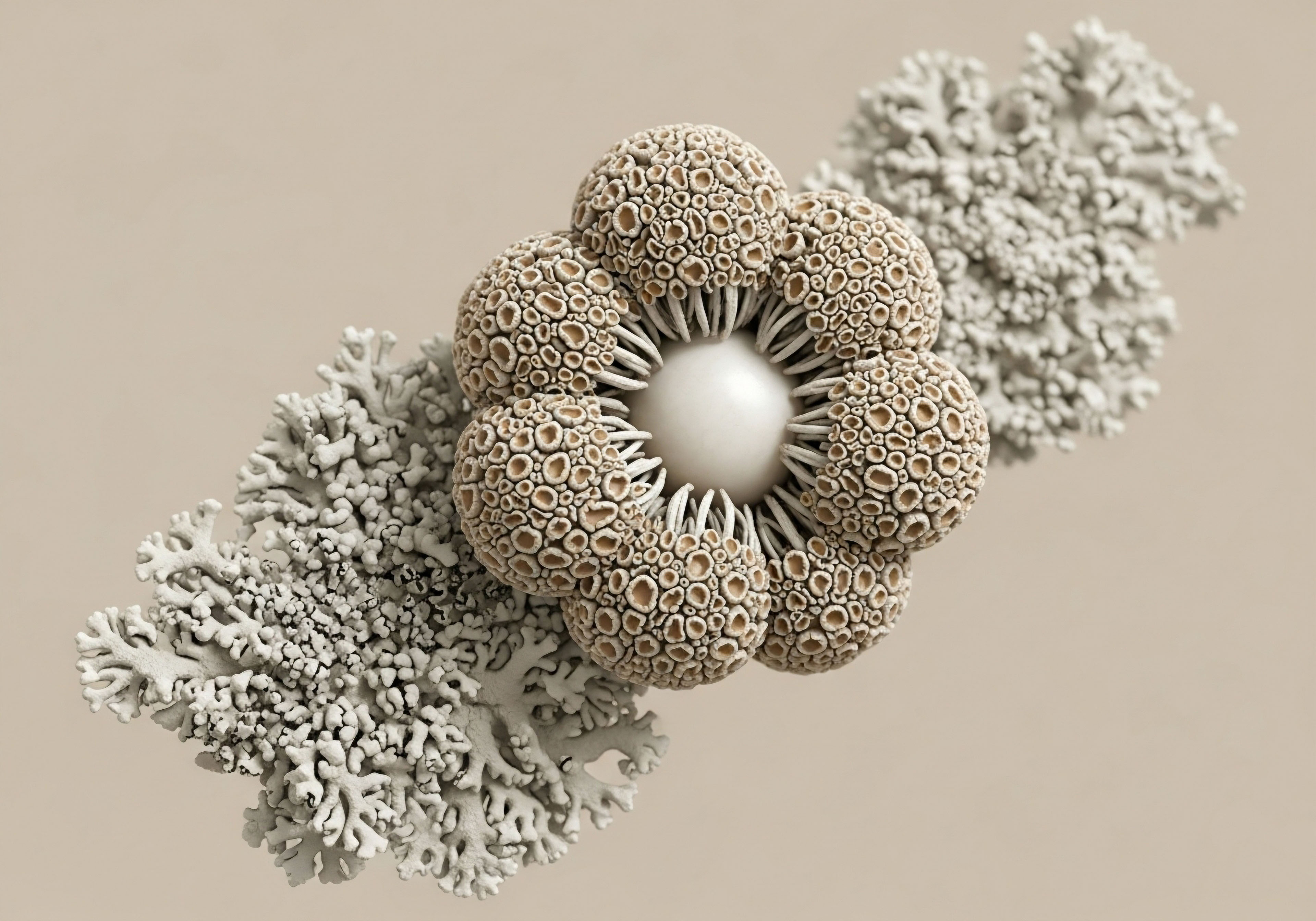

Fundamentals
Have you ever found yourself experiencing subtle yet persistent shifts in your well-being, perhaps a lingering fatigue that defies a good night’s rest, or a subtle dulling of mental clarity that was once sharp? Many individuals report changes in their physical resilience, emotional equilibrium, or even their body composition, often without a clear explanation.
These experiences, while common, can signal deeper physiological adjustments occurring within your body’s intricate messaging network ∞ the endocrine system. Understanding these internal communications is the first step toward reclaiming your vitality and function.
The endocrine system orchestrates a symphony of biological processes through chemical messengers known as hormones. These powerful compounds, secreted by various glands, travel through the bloodstream to target cells and tissues, influencing everything from your metabolic rate and energy production to your mood, sleep patterns, and reproductive health. When this delicate balance is disrupted, whether by age, environmental factors, or lifestyle choices, the effects can ripple throughout your entire system, manifesting as the very symptoms you might be experiencing.
Hormonal optimization protocols, such as testosterone replacement therapy or peptide interventions, aim to restore this balance, supporting your body’s innate capacity for health. However, a common inquiry arises ∞ can dietary interventions alone prevent all potential side effects associated with these powerful biochemical recalibrations? This question invites a deeper exploration of how nutrition interacts with our internal chemistry.
Dietary choices form the bedrock of metabolic health, influencing how your body processes nutrients, manages inflammation, and maintains cellular function. A well-structured eating plan provides the essential building blocks for hormone synthesis and supports the pathways responsible for hormone transport and detoxification. Without adequate nutritional support, the body struggles to maintain optimal function, regardless of external hormonal support.
Understanding your body’s hormonal signals is the initial step toward restoring overall well-being.

The Body’s Internal Messaging System
Hormones function as the body’s sophisticated internal messaging service, transmitting vital instructions across vast distances to regulate complex physiological activities. Consider insulin, a hormone produced by the pancreas, which manages blood sugar levels by facilitating glucose uptake into cells for energy. Or think of thyroid hormones, which govern your metabolic rate, impacting how quickly your body converts food into energy. Each hormone plays a specific role, yet they operate within an interconnected web, constantly influencing one another.
When external hormones are introduced through optimization protocols, the body’s existing feedback loops are affected. For instance, in testosterone replacement therapy for men, exogenous testosterone can signal the brain to reduce its own production of testosterone, impacting the hypothalamic-pituitary-gonadal (HPG) axis. This intricate interplay underscores why a holistic perspective, beyond just hormone administration, is essential.

Foundational Role of Nutrition
Nutrition provides the raw materials and regulatory signals for every biological process, including hormonal balance. A diet rich in whole, unprocessed foods supplies the necessary vitamins, minerals, proteins, and healthy fats that are indispensable for hormone synthesis and receptor sensitivity. Conversely, a diet high in refined sugars and unhealthy fats can promote systemic inflammation and insulin resistance, creating an environment that impedes optimal hormonal function.
For example, adequate protein intake provides the amino acids required for the production of peptide hormones, which regulate growth, energy metabolism, and appetite. Healthy fats, particularly omega-3 fatty acids, are crucial for the synthesis of steroid hormones, including testosterone and estrogen, and play a role in modulating inflammatory responses. Micronutrients such as zinc and vitamin D are directly linked to testosterone synthesis and overall hormonal health.
The relationship between diet and hormonal health extends to the body’s ability to manage stress. Chronic stress can elevate cortisol levels, a hormone produced by the adrenal glands, which can then influence other hormonal pathways. Diets abundant in omega-3 fatty acids, legumes, and whole grains, rich in antioxidants and anti-inflammatory compounds, can help mitigate elevated cortisol levels and support overall hormonal equilibrium.
This foundational understanding reveals that while hormonal optimization protocols directly address specific deficiencies, the underlying metabolic terrain, shaped significantly by dietary habits, determines the body’s receptiveness to these interventions and its capacity to manage potential physiological shifts.


Intermediate
Embarking on hormonal optimization protocols represents a significant step toward restoring physiological balance and enhancing well-being. These interventions, while powerful, necessitate a comprehensive understanding of their mechanisms and potential physiological responses. The question of whether dietary strategies alone can prevent all associated effects requires a detailed examination of how specific protocols interact with the body’s systems and where nutrition can offer substantial support.
Hormone replacement therapy (HRT) and peptide therapies are designed to address specific hormonal deficiencies or to stimulate endogenous hormone production. For instance, Testosterone Replacement Therapy (TRT) for men experiencing symptoms of low testosterone involves administering exogenous testosterone, typically via weekly intramuscular injections of Testosterone Cypionate. This approach aims to restore testosterone levels to a healthy range, improving energy, muscle mass, and mood. However, introducing external hormones can lead to shifts in the body’s internal regulatory systems.
Dietary strategies are powerful allies in hormone optimization, yet they do not negate the need for comprehensive clinical oversight.

Testosterone Replacement Therapy for Men
Standard TRT protocols often include additional medications to manage potential side effects. Gonadorelin, administered via subcutaneous injections, helps maintain natural testosterone production and fertility by stimulating the pituitary gland. Anastrozole, an oral tablet, is frequently prescribed to inhibit the conversion of testosterone into estrogen, thereby reducing estrogen-related effects such as gynecomastia or water retention. Even with these adjuncts, the body’s response is individual, and dietary support becomes a critical component of a successful regimen.
Dietary interventions can significantly influence the efficacy and tolerability of TRT. A diet rich in lean proteins, healthy fats, and complex carbohydrates provides the necessary macronutrients for muscle growth and energy, amplifying the benefits of testosterone. Furthermore, specific micronutrients play a direct role. Zinc, found in foods like oysters and lean beef, acts as a catalyst in testosterone production and metabolism. Vitamin D, obtained from sunlight exposure or fortified foods, is also linked to healthy testosterone levels.
Common side effects of TRT, such as weight gain, changes in lipid profiles, or fluid retention, can often be mitigated through targeted dietary strategies. For example, managing sodium and potassium intake through a diet rich in fresh fruits, vegetables, and whole grains can help address fluid balance. A focus on anti-inflammatory foods, including berries, leafy greens, and fatty fish, can reduce systemic inflammation that might otherwise exacerbate symptoms.

Hormonal Balance for Women
For women, hormonal balance protocols address symptoms associated with peri-menopause, post-menopause, or other hormonal fluctuations. Protocols may involve low-dose Testosterone Cypionate via subcutaneous injection, often alongside Progesterone, which is prescribed based on menopausal status. Pellet therapy, offering long-acting testosterone, may also be considered, sometimes with Anastrozole if estrogen conversion is a concern.
Dietary considerations for women undergoing hormonal optimization are equally vital. A low-fat, high-carbohydrate diet may alleviate breast tenderness, a potential effect of estrogenic therapies. Adjusting meal timing and consuming food with medication can help manage gastrointestinal symptoms like bloating or nausea. Lifestyle changes, including exercise and stretching, can improve leg cramps.
The Mediterranean diet, with its emphasis on whole grains, fish, and cruciferous vegetables, has been shown to support estrogen metabolism and may help reduce elevated estrogen levels, which can be a risk factor for certain conditions. This dietary pattern, rich in antioxidants and fiber, also supports gut health, which is intimately linked to hormone detoxification and balance.

Peptide Therapies and Nutritional Synergy
Growth hormone peptide therapy, utilizing agents like Sermorelin, Ipamorelin/CJC-1295, or Tesamorelin, aims to stimulate the body’s natural production of growth hormone, supporting anti-aging, muscle gain, fat loss, and sleep improvement. Other targeted peptides, such as PT-141 for sexual health or Pentadeca Arginate (PDA) for tissue repair, also represent specific biochemical interventions.
While these peptides offer targeted benefits, their optimal function is synergistically supported by a nutrient-dense diet. Adequate protein intake is crucial for muscle repair and growth, which is a primary goal of many peptide therapies. Healthy fats support cellular integrity and signaling, which are fundamental to peptide action. Hydration is also paramount, as water is essential for cellular function, detoxification, and the transport of these bioactive compounds throughout the body.
The table below illustrates how specific dietary components can support various aspects of hormonal health and mitigate common concerns associated with optimization protocols.
| Dietary Component | Role in Hormonal Health | Potential Side Effect Mitigation |
|---|---|---|
| Lean Proteins (e.g. chicken, fish, legumes) | Building blocks for hormones; muscle maintenance and growth. | Supports muscle mass, aids weight management, reduces fatigue. |
| Healthy Fats (e.g. avocados, olive oil, nuts, fatty fish) | Essential for steroid hormone production; anti-inflammatory. | Improves insulin sensitivity, supports cellular function, reduces inflammation. |
| Complex Carbohydrates (e.g. quinoa, oats, sweet potatoes) | Sustained energy source; fiber for blood sugar stability. | Stabilizes blood sugar, prevents energy crashes, supports gut health. |
| Fiber-Rich Foods (e.g. fruits, vegetables, whole grains) | Supports gut microbiome; aids hormone detoxification. | Promotes satiety, regulates bowel movements, helps manage weight. |
| Antioxidant-Rich Produce (e.g. berries, leafy greens) | Reduces oxidative stress; anti-inflammatory compounds. | Combats inflammation, supports cellular health, potentially reduces hot flashes. |
| Micronutrients (e.g. Zinc, Vitamin D, Magnesium) | Cofactors for hormone synthesis and receptor function. | Supports testosterone production, bone health, mood regulation. |
While dietary strategies are undeniably powerful in supporting hormonal health and minimizing many common side effects, they do not represent a singular solution for all potential physiological responses to hormone optimization protocols. The direct pharmacological actions of exogenous hormones, or the intricate feedback loops they influence, can sometimes lead to effects that require specific medical management beyond nutritional adjustments. This highlights the importance of a collaborative approach with a healthcare provider, integrating clinical interventions with personalized lifestyle strategies.


Academic
The assertion that dietary interventions alone can prevent all side effects of hormone optimization protocols warrants a rigorous, systems-biology examination. While nutrition forms an indispensable foundation for physiological resilience, the intricate biochemical cascades initiated by exogenous hormone administration, or the stimulation of endogenous pathways, often extend beyond the sole regulatory capacity of diet. A deep understanding requires dissecting the interplay of various biological axes, metabolic pathways, and the profound influence of the gut microbiome.
Hormone optimization protocols, whether involving direct hormone replacement or peptide-mediated stimulation, introduce or modulate potent signaling molecules that interact with highly specific receptors and feedback loops. The body’s endocrine system operates as a finely tuned orchestra, where each hormone is a specific instrument, and the overall harmony depends on precise timing and amplitude of signals. Introducing a new instrument, or adjusting the volume of an existing one, can create ripple effects that necessitate a multi-modal management strategy.
The body’s endocrine system functions as a complex, interconnected network, where dietary signals and exogenous hormones engage in a dynamic interplay.

Interconnected Biological Axes and Metabolic Regulation
The human body’s hormonal regulation is governed by several interconnected axes, most notably the Hypothalamic-Pituitary-Gonadal (HPG) axis, the Hypothalamic-Pituitary-Adrenal (HPA) axis, and the Hypothalamic-Pituitary-Thyroid (HPT) axis. These axes are not isolated; they constantly communicate and influence each other, forming a complex neuroendocrine network.
For instance, in male TRT, the administration of exogenous testosterone can suppress the HPG axis, leading to reduced luteinizing hormone (LH) and follicle-stimulating hormone (FSH) secretion from the pituitary, which in turn diminishes testicular testosterone production and spermatogenesis.
While Gonadorelin can be used to mitigate this suppression, its efficacy is dependent on the individual’s physiological response and the duration of exogenous hormone exposure. Dietary factors, such as specific amino acids or micronutrients, contribute to neurotransmitter synthesis within the hypothalamus, but they cannot fully override the direct negative feedback exerted by supraphysiological hormone levels.
Metabolic health is inextricably linked to hormonal function. Endocrine disorders, including obesity and diabetes, are characterized by metabolic dysregulation that often involves altered hormone secretion or receptor sensitivity. For example, insulin resistance, a condition where cells become less responsive to insulin, can be exacerbated by chronic inflammation and certain dietary patterns high in refined sugars and saturated fats.
While an anti-inflammatory diet can significantly improve insulin sensitivity, the metabolic shifts induced by hormone optimization, such as changes in body composition or lipid metabolism, may still require specific pharmacological adjustments.
Consider the impact of hormone optimization on lipid profiles. Testosterone administration, particularly at higher doses, can sometimes influence cholesterol levels, potentially increasing low-density lipoprotein (LDL) cholesterol or decreasing high-density lipoprotein (HDL) cholesterol. While a diet rich in monounsaturated and polyunsaturated fats, fiber, and plant sterols can positively influence lipid metabolism, it may not entirely counteract the direct effects of hormonal shifts on hepatic lipid processing or lipoprotein lipase activity.

The Gut Microbiome as an Endocrine Modulator
Emerging research highlights the gut microbiome as a significant, albeit often overlooked, endocrine organ. The trillions of microorganisms residing in the gastrointestinal tract produce a vast array of metabolites, including short-chain fatty acids (SCFAs), which directly influence host metabolism, immune function, and even neuroendocrine signaling.
The gut microbiota plays a critical role in the metabolism and enterohepatic circulation of steroid hormones, including estrogens and androgens. Specific bacterial enzymes, such as beta-glucuronidase, can deconjugate hormones that have been marked for excretion, returning them to their active forms in circulation. Dysbiosis, an imbalance in gut microbial composition, can alter this process, potentially leading to either an excess or deficiency of circulating active hormones, which can then contribute to various health conditions.
For individuals undergoing hormone optimization, the state of their gut microbiome can influence how effectively exogenous hormones are metabolized and how well the body manages their byproducts. An unhealthy gut environment, characterized by increased intestinal permeability or chronic low-grade inflammation, can contribute to systemic inflammation, which in turn can affect hormone receptor sensitivity and overall metabolic health.
While a diet rich in prebiotics and probiotics can support a healthy gut microbiome, it cannot solely prevent all hormonal fluctuations or side effects that stem from the direct pharmacological action of administered hormones.
The table below outlines the complex interplay between dietary factors, biological systems, and the limitations of diet alone in managing hormone optimization side effects.
| Biological System/Pathway | Dietary Influence | Limitations of Diet Alone in HRT Side Effect Management |
|---|---|---|
| HPG Axis Suppression (e.g. TRT in men) | Nutrient support for neurotransmitter synthesis; general health. | Cannot fully counteract direct negative feedback on pituitary/gonadal function by exogenous hormones. |
| Estrogen Conversion (e.g. aromatization of testosterone) | Cruciferous vegetables (DIM), fiber for estrogen excretion. | Cannot fully inhibit enzymatic conversion; pharmacological aromatase inhibitors (Anastrozole) may be necessary. |
| Metabolic Shifts (e.g. lipid profile changes, insulin sensitivity) | Balanced macronutrients, anti-inflammatory foods, fiber. | May not fully normalize lipid profiles or insulin resistance if driven by direct hormonal effects or pre-existing severe metabolic dysfunction. |
| Fluid Retention/Edema | Sodium/potassium balance, adequate hydration. | Direct hormonal effects on mineralocorticoid receptors or vascular permeability may require diuretic or dose adjustments. |
| Gut Microbiome Dysregulation | Prebiotic/probiotic-rich foods, diverse plant fibers. | Cannot fully prevent shifts in microbial composition or enzymatic activity influenced by systemic hormonal changes or specific medications. |
| Inflammation | Anti-inflammatory diet (omega-3s, antioxidants). | Cannot eliminate inflammation stemming from direct pharmacological responses or underlying autoimmune/chronic conditions exacerbated by hormonal shifts. |

Beyond Dietary Interventions
While dietary interventions are foundational and can significantly mitigate many side effects by optimizing metabolic function and supporting detoxification pathways, they cannot unilaterally prevent all potential physiological responses to hormone optimization protocols. The direct pharmacological actions of administered hormones, their specific receptor binding affinities, and the complex, often compensatory, feedback mechanisms within the endocrine system mean that some effects are inherent to the intervention itself.
For example, the impact of testosterone on red blood cell production (hematocrit) or the potential for certain peptides to influence glucose metabolism are direct physiological effects that, while potentially influenced by diet, are not solely preventable through nutritional means. Similarly, individual genetic predispositions to certain side effects, or the presence of underlying health conditions, can dictate responses that extend beyond dietary control.
A truly comprehensive approach to managing hormone optimization protocols involves a synergistic integration of precise clinical oversight, individualized dietary strategies, targeted exercise regimens, stress modulation techniques, and optimized sleep hygiene. Dietary interventions are powerful tools for building a resilient physiological foundation, but they function as a vital component within a broader, personalized wellness protocol, not as a standalone panacea for every potential side effect.
This integrated perspective acknowledges the body’s profound complexity and the necessity of a multi-faceted strategy for achieving and sustaining optimal health.

References
- Huberman, A. (2023). Hormone Health. Huberman Lab.
- South West London Integrated Medicines Optimisation. (2021). Hormone Replacement Therapy (HRT) Guidance and Treatment Pathway.
- Medical Specialists. (2025). The Ultimate TRT Diet Guide ∞ 12 Proven Nutrition Rules to Help Supercharge Your Testosterone Replacement Therapy.
- Healthline. (2023). 10 Natural Ways to Balance Your Hormones.
- Academy of Nutrition and Dietetics. (2023). What to Eat When Transitioning with Hormone Therapy.
- North Dallas Wellness. (2024). Nutritional Support for Men on Testosterone Replacement Therapy.
- Hims. (2025). The Role of Diet and Exercise in Testosterone Replacement Therapy (TRT).
- Heart and Health Medical. (2024). How Endocrine Disorders Affect Metabolism.
- The Institute for Functional Medicine. (2025). Nutrition and Impacts on Hormone Signaling.
- Miyé. (2025). Diet and hormone balance ∞ how nutrition influences our hormones.
- MDPI. (2023). Impact of Probiotics and Prebiotics on Gut Microbiome and Hormonal Regulation.
- PubMed Central. (2020). The Influence of the Gut Microbiome on Host Metabolism Through the Regulation of Gut Hormone Release.
- The Institute for Functional Medicine. (2023). Sex Hormones and the Gut Microbiome.
- NHS Wales Performance and Improvement. (2023). How to manage the side effects of hormone therapy.

Reflection
Having explored the intricate relationship between dietary interventions and hormone optimization protocols, consider your own unique biological blueprint. The knowledge presented here serves as a compass, guiding you toward a deeper appreciation of your body’s remarkable capacity for adaptation and balance.
Your personal health journey is a dynamic process, requiring continuous observation, thoughtful adjustment, and a willingness to collaborate with clinical expertise. This understanding empowers you to make informed choices, moving beyond simplistic solutions to embrace a truly personalized path toward sustained vitality.



